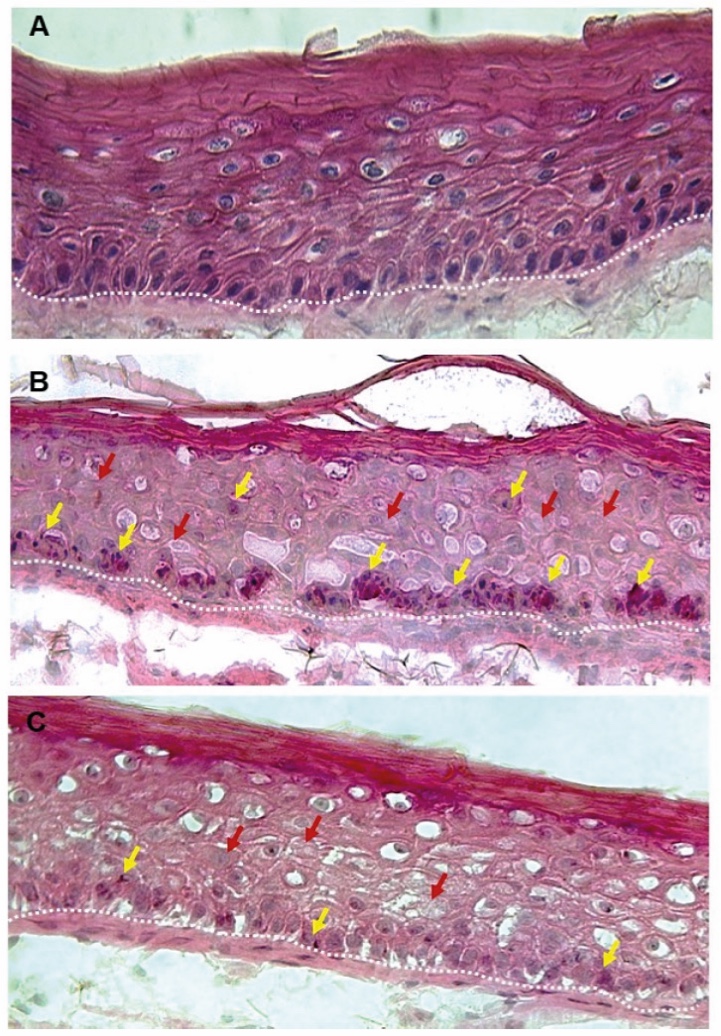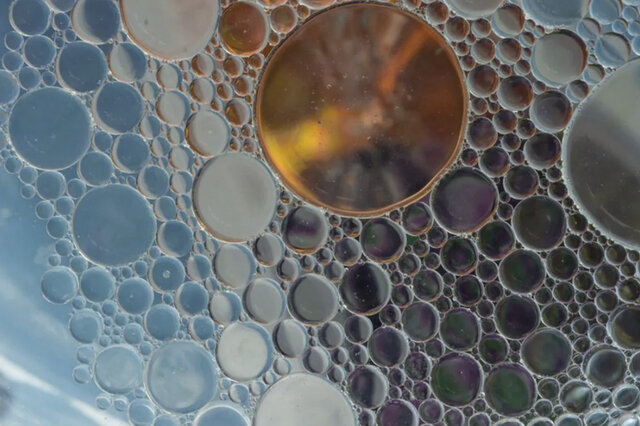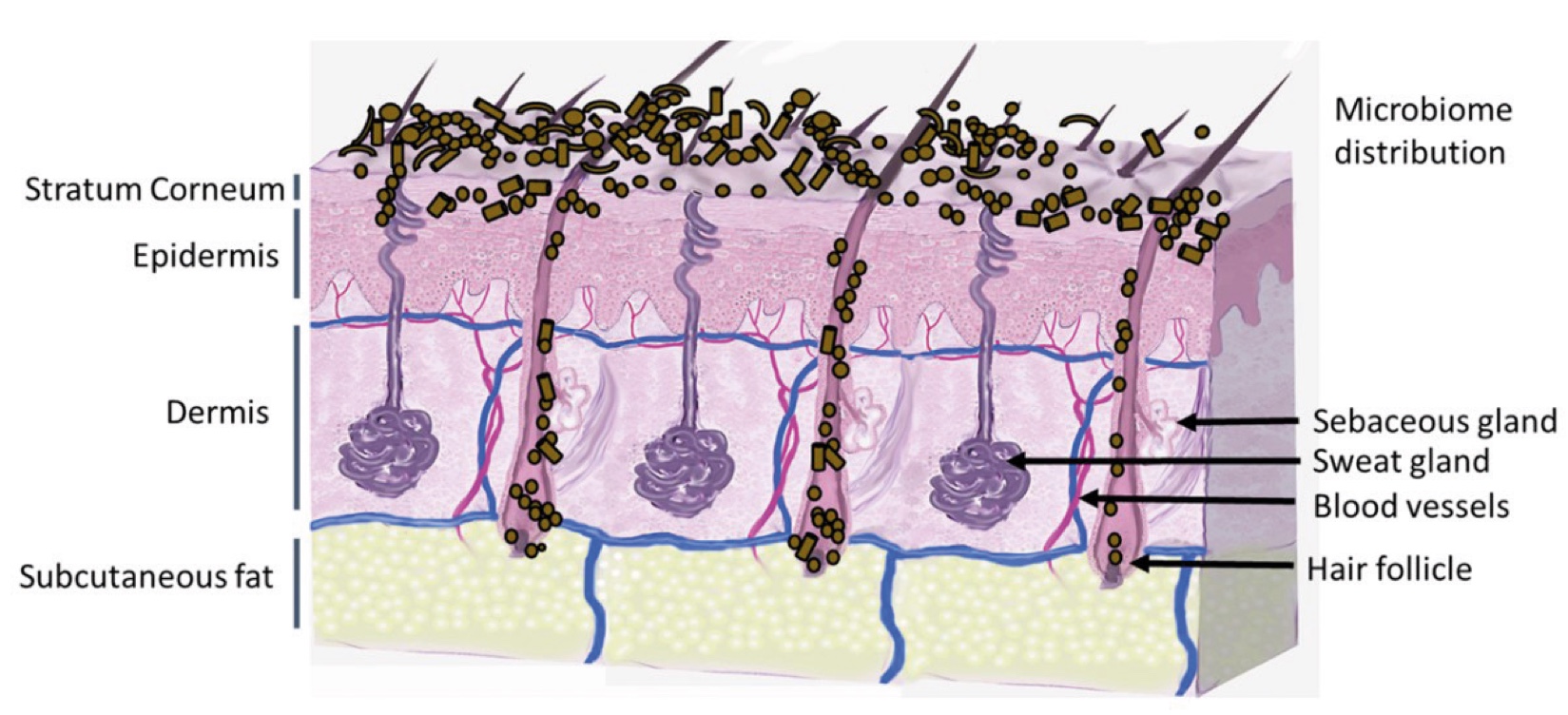
Hero Ingredients
Skin care
peer-reviewed
Making waves:
Understanding the marine ingredient fucoidan
ROD SHELLEY
Business Development Manager, Marinova Pty Ltd, Tasmania, Australia
ABSTRACT: Ongoing exploration of the marine environment, and the rise of innovative blue biotechnologies, continues to present new solutions to the personal care industry. Today’s premium marine ingredients tick many boxes – they are natural, efficacious and sustainably sourced.
Fucoidans, polysaccharides found in brown seaweeds, are unique marine compounds attracting increasing global attention. A growing dossier of supporting scientific evidence, a sustainable supply chain, and wide range of applications are making waves with innovative product formulators. The aim of this article is to provide an overview of the unique marine ingredient fucoidan.
??????????????????
“
“A study in healthy women providing probiotic yogurt for four weeks showed an improvement in emotional responses as measured by brain scans”

Figure 1. Skin Section with Microbiome. Most microorganisms live in the superficial layers of the stratum corneum and in the upper parts of the hair follicles. Some reside in the deeper areas of the hair follicles and are beyond the reach of ordinary disinfection procedures. There bacteria are a reservoir for recolonization after the surface bacteria are removed.
Materials and methods
Studies of major depressive disorder have been correlated with reduced Lactobacillus and Bifidobacteria and symptom severity has been correlated to changes in Firmicutes, Actinobacteria, and Bacteriodes. Gut microbiota that contain more butyrate producers have been correlated with improved quality of life (1).
A study in healthy women providing probiotic yogurt for four weeks showed an improvement in emotional responses as measured by brain scans (2). A subsequent study by Mohammadi et al. (3) investigated the impacts of probiotic yogurt and probiotic capsules over 6 weeks and found a significant improvement in depression-anxiety-stress scores in subjects taking the specific strains of probiotics contained in the yogurt or capsules. Other studies with probiotics have indicated improvements in depression scores, anxiety, postpartum depression and mood rating in an elderly population (4-7).
Other studies have indicated a benefit of probiotic supplementation in alleviating symptoms of stress. In particular, researchers have looked at stress in students as they prepared for exams, while also evaluating other health indicators such as flu and cold symptoms (1). In healthy people, there is an indication that probiotic supplementation may help to maintain memory function under conditions of acute stress.
The rise of marine ingredients
The cosmetics industry continues to be fueled by consumer demand for science-backed products that not only improve skin appearance, but that are natural and sustainable. A global shift away from synthetic ingredients towards those of natural origin is well underway. A recent market report revealed that the global natural skincare products market is predicted to reach a value of US$13.4B by 2032, representing market growth of approximately 6.5% (1).
Reflecting adaptation to the challenges of the ocean environment, unique biochemical compounds can be found in marine life that are not present in terrestrial organisms. As these compounds continue to be identified and studied, an impressive body of scientific evidence is emerging to attest to their benefits in skincare and dermal health applications. Seaweed derived compounds are amongst those garnering particular interest from researchers. In addition to their demonstrated bioactivities, they offer distinct advantages in terms of renewability and supply chain transparency (2).
What is fucoidan?
Seaweeds, or macroalgae, are divided into three major groups based on their colour – red (Rhodophyta), green (Chlorophyta) and brown (Phaeophyta). Fucoidans are naturally occurring polysaccharides that are only found in brown seaweeds. They are produced in the cell walls of the seaweed and function to provide protection from external stressors, such as water-borne pathogens.
There are now more than 4,000 published scientific papers attesting to the beneficial bioactivities of fucoidans in a range of human health settings (3). Whilst widely utilised as innovative and functional ingredients in market-leading nutritional supplements, fucoidans are increasingly being incorporated into topical skincare applications (4). In recent years, high purity fucoidans have found a place as hero ingredients for premium skincare brands.
Scientific evidence
High purity, certified organic fucoidan extracts have been specifically developed for topical applications. A significant number of in vitro and clinical studies have highlighted the benefits of these extracts for skincare. They have been shown to be effective in protecting and soothing the skin, in balancing the skin microbiome and pH, and in skin brightening (5, 6).
Clinical trials investigating sun damaged skin after exposure to UVA and UVB demonstrated that high purity fucoidans were effective in protecting and soothing the skin, resulting in a significant reduction in water loss and skin redness – up to 45–50% relative to the control group (5). In vitro studies, utilising the same fucoidans, have led to significant alterations in gene expression, particularly those associated with skin barrier function, wound healing processes and fluid accumulation (6).
A clinical study found that the pH of skin treated with a serum spray formulated with high purity fucoidan was positively lowered after 28 days of use (7). In vitro studies have shown that high purity fucoidans can significantly reduce the adhesion of Cutibacterium acnes, one of the primary bacteria associated with acne (6). In these same studies, fucoidan did not affect the adhesion of the beneficial skin bacterium, Staphylococcus epidermidis.
A unique fucoidan-polyphenol complex has been shown to be effective in brightening the skin. In an in vitro study, the complex inhibited tyrosinase, the enzyme responsible for melanin synthesis, by 99% at very low concentrations (5). In a clinical study, this translated into an improvement in skin brightness in 50% of subjects after 60 days of use (5). The same study also demonstrated a 20% decrease in colour spot intensity and a reduction of skin spot appearance in 65% of participants.
Extraction from which seaweed species?
Fucoidans are commercially extracted from a range of brown seaweeds. It is important to note that, like many ingredients, not all fucoidans are the same. Bioactivity is dependent upon both the seaweed species from which the fucoidan has been derived and the method of extraction (8). Traditional methods of extraction may compromise the integrity and functionality of the resulting fucoidans. Today, the world’s leading fucoidan suppliers utilise advanced biotechnologies, including aqueous extraction processes to yield natural extracts of superior quality with enhanced bioactivity. They are also compliant with global regulatory requirements (9).
Two of the most common seaweed species are Undaria pinnatifida (commonly known as wakame) and Fucus vesiculosus (commonly known as bladderwrack). Fucoidans from these species of seaweed have been widely studied and clinically tested.

Sustainable & ethical sourcing
Seaweeds and seaweed-derived compounds are attractive for healthcare applications due to their renewability, abundance and positive environmental footprint (10). There are fucoidan suppliers utilising cultivated seaweeds and those utilising wild harvested seaweeds. It is important to verify the provenance of all fucoidan extracts, with a particular eye to sourcing seaweeds that have grown in clean waters and, where appropriate, that harvesting promotes sustainable and inclusive employment for regional communities (11).
International suppliers leading the fucoidan industry boast award-winning sustainability practices that align with key Sustainable Development Goals (SDGs) and Blue BioTrade Principles and Criteria identified by the United Nations. They also harvest on an environmentally sustainable basis in accordance with CITES (Convention on International Trade in Endangered Species) and the Nagoya Protocol (12). Some fucoidan suppliers have even raised the sustainability bar by harvesting invasive seaweeds. The removal of introduced pest species simultaneously provides benefits not only for human health, but the planet as a whole.
Formulation & applications
Fucoidans are innovative and versatile ingredients. They are typically supplied as a dry powder and are water soluble. Fucoidans can be utilised as stand-along bioactives or easily incorporated into multi-ingredient formulations. High purity, certified organic fucoidans are ideal for inclusion in a wide range of cosmetic applications including creams, gels, masks, serums and sprays.
The granting of regulatory approvals in the EU and USA in recent years (13) has spurred an increasing number of skincare brands to include oral supplements in their range. Fucoidans are well suited to encapsulation for beauty-from-within formulations. A wide range of studies demonstrate their potential benefits, including for immune support, gut health and healthy ageing applications (13, 14, 15).
A market perspective
A recent report by Fortune Business Insights notes that the European fucoidan market is predicted to reach USD 214.67 million by 2030, representing a CAGR of 7.78% (16). The report notes the rising demand for clean cosmetic products in the European market as consumers move away from synthetic and towards natural alternatives. More broadly, the World Bank’s recent Global Seaweed, New and Emerging Markets Report notes that seaweeds and their bioactive compounds are expected to fuel a global seaweed nutraceutical market of USD $3.9 billion by 2030 (17). Furthermore, it predicts the global fucoidan B2B market to grow by more than 26% by 2028.
Alongside these predictions, global seaweed production is rising to meet the anticipated demand (18). The utilisation of bioactive seaweed compounds, including fucoidan, is certainly worth consideration by innovative formulators looking to the future of sustainable and efficacious ingredients.
Conclusion
The future of cosmetics lies in the continued evolution of holistic approaches which represents a transformative shift in the industry, merging scientific advancements, natural ingredients, and wellness principles. By understanding and embracing the interconnectedness of these elements, the cosmetics industry can cultivate products that not only enhance external beauty but also contribute to the overall well-being of individuals and the planet.
The interplay between beauty from within and topical cosmetics is the key for future products. The integration of biotechnology and green chemistry is revolutionizing cosmetic formulations, offering sustainable and biocompatible alternatives.
Developers can implement blockchain to trace the journey of ingredients from source to product. Nevertheless, the efficacy of the natural products should be scientifically proven. Marketers can communicate transparency as a brand value, and parallelly educate consumers by highlighting how specific ingredients contribute to radiant and healthy skin.
By embracing the synergy between these approaches and leveraging scientific advancements, the cosmetics industry can provide consumers with comprehensive beauty solutions that cater to both internal and external dimensions of beauty.
Surfactant Applications

The application area lends itself particularly well to the use of AI. Active today in this area is the US company Potion AI (6). The company provides AI-powered formulation tools for beauty and personal care R&D. Their offerings include Potion GPT, next generation ingredient and formula databases and AI document processing. Potion’s work could have a significant impact on the entire surfactant value chain, from raw material suppliers to end consumers. By using their GPT technology, they can help target work toward novel surfactant molecules that have optimal properties for specific applications. By using their ingredient and formula databases, they can access and analyze a vast amount of data on surfactant performance, safety, and sustainability. By using their AI document processing, they can extract and organize relevant information from patents, scientific papers, and regulatory documents. These capabilities could enable Potion AI's customers to design and optimize surfactant formulations that are more effective, eco-friendly, and cost-efficient. A particularly interesting application for this type of capability is deformulation.
Deformulation is the process of reverse engineering a product's formulation by identifying and quantifying its ingredients. Deformulation can be used for various purposes, such as quality control, competitive analysis, patent infringement, or product improvement. However, deformulation can be challenging, time-consuming, and costly, as it requires sophisticated analytical techniques, expert knowledge, and access to large databases of ingredients and formulas.
AI can potentially enhance and simplify the deformulation process by using data-driven methods to infer the composition and structure of a product from its properties and performance. For example, AI can use machine learning to learn the relationships between ingredients and their effects on the product's characteristics, such as color, texture, fragrance, stability, or efficacy. AI can also use natural language processing to extract and analyze information from various sources, such as labels, patents, literature, or online reviews, to identify the possible ingredients and their concentrations in a product.

Figure 2. Skin Section with Microbiome. Most microorganisms live in the superficial layers of the stratum corneum and in the upper parts of the hair follicles. Some reside in the deeper areas of the hair follicles and are beyond the reach of ordinary disinfection procedures. There bacteria are a reservoir for recolonization after the surface bacteria are removed.
References and notes
- https://www.factmr.com/report/natural-skin-care-products-market
- Lopez-Hortas L, Florez-Fernandez N, Torres MD, Ferreira-Anta T, Casas MP, Balboa EM, et al. Applying seaweed compounds in cosmetics, cosmeceuticals and nutricosmetics. Mar Drugs. 2021;19(10):1–30.
- www.scopus.com
- Costa JP, Custódio L, Reis CP. Exploring the Potential of Using Marine-Derived Ingredients: From the Extraction to Cutting-Edge Cosmetics. Marine Drugs. 2023; 21(12):620.
- Fitton JH, Dell’Acqua G, Gardiner VA, Karpiniec SS, Stringer DN, Davis E. Topical benefits of two fucoidan-rich extracts from marine macroalgae. Cosmetics. 2015;2(2):66–81.
- Park AY, Bourtembourg M, Chrétien A, Hubaux R, Lancelot C, Salmon M, et al. Modulation of gene expression in a sterile atopic dermatitis model and inhibition of Staphylococcus aureus adhesion by fucoidan. Dermatopathology (Basel). 2021;8(2):69–83.
- Janssens-Böcker C, Wiesweg K, Doberenz C. The tolerability and effectiveness of marine-based ingredients in cosmetics: A split-face clinical study of a serum spray containing Fucus vesiculosus extract, Ulva lactuca extract, and ectoin. Cosmetics. 2023;10:93.
- Chadwick M, Carvalho LG, Vanegas C, Dimartino S. A Comparative Review of Alternative Fucoidan Extraction Techniques from Seaweed. Marine Drugs. 2025; 23(1):27.
- www.maritechfucoidan.com.au/the-maritech-process/
- Pereira L, Cotas J. Seaweed: a sustainable solution for greening drug manufacturing in the pursuit of sustainable healthcare. Exploration of Drug Science. 2024;2:50–84.
- Mac Monagail, M., Cornish, L., Morrison, L., Araújo, R., & Critchley, A. T. (2017). Sustainable harvesting of wild seaweed resources. European Journal of Phycology, 52(4), 371–390.
- www.marinova.com.au/sustainability/
- Fitton JH, Stringer DN, Park AY, Karpiniec SS. Therapies from Fucoidan: New Developments. Marine Drugs. 2019; 17(10):571.
- Apostolova E, Lukova P, Baldzhieva A, Katsarov P, Nikolova M, Iliev I, Peychev L, Trica B, Oancea F, Delattre C, Kokova V. Immunomodulatory and Anti-Inflammatory Effects of Fucoidan: A Review. Polymers (Basel). 2020 Oct 13;12(10):2338.
- Yang C, Dwan C, Wimmer BC, Wilson R, Johnson L, Caruso V. Fucoidan from Undaria pinnatifida Enhances Exercise Performance and Increases the Abundance of Beneficial Gut Bacteria in Mice. Marine Drugs. 2024; 22(11):485.
- www.fortunebusinessinsights.com/europe-fucoidan-market-107877
- World Bank. 2023. Global Seaweed: New and Emerging Markets Report, 2023. © Washington, DC: World Bank.
- Zhang, L., Liao, W., Huang, Y. et al. Global seaweed farming and processing in the past 20 years. Food Production Processing and Nutrition 4, 23 (2022).
